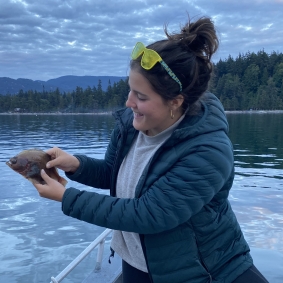Knauss legislative fellowships in Congress help build careers — and they're fun and educational. See our video and fact sheet for details.
Casey Willson

Fellowship Institution:
NOAA OAR Climate Program OfficeStart Year:
2025Casey Willson is serving as an Executive Knauss Fellow with the Climate Program Office’s Climate and Fisheries Adaptation team at NOAA’s Office of Oceanic and Atmospheric Research.
She graduated from American University and the University for Peace in Costa Rica where she earned two master’s degrees, one in International Affairs and the other in Natural Resources and Sustainable Development. Her graduate work included a practicum where she studied human rights due diligence in the seafood industry and the threat that illegal, unreported, and unregulated fishing pose to human rights and the environment.
Prior to her Knauss fellowship, Casey worked at a nonprofit called the North American Marine Alliance where she supported small and medium scale fishers as well as values-based aquaculture. She is passionate about supporting community-based fisheries and the importance of fishing communities to our nation’s culture and economy.
Call for Symposium Presenters and Authors
The Chesapeake Rising: Innovative Law and Policy Solutions for Climate Adaptation in Coastal Communities symposium will explore key legal and policy considerations that affect climate adaptation strategies. It provides a unique opportunity for upper-level law students and early-career lawyers to present and publish their legal scholarship.
Program Announcements
-
-
Maryland Sea Grant has program development funds for start-up efforts, graduate student research, or strategic support for emerging areas of research. Apply here.
News and Blogs
Video Gallery
Sea Grant Film Explores a Diminishing Smithville
Smithville is a community on Maryland’s Eastern Shore, on the edge of the Blackwater National Wildlife Refuge. A century ago, Smithville had more than 100 residents. Today, it has four, in two homes: an elderly couple, and one elderly woman and her son, who cares for her.
Featured Fellow
Featured Research Project
Developing a habitat model for mysids, an important link in Chesapeake Bay food webs
Mysids are important mesozooplankton prey for many species of fish in Chesapeake Bay and are an important link in transferring energy from lower to upper trophic levels. Mysids also serve as biological vectors for benthic-pelagic coupling due to their diel vertical migration and omnivorous prey-switching behavior, which makes mysids important regulators of food web architecture. Despite their central role in coastal food webs, surprisingly little is known about mysid ecology and dynamics in Chesapeake Bay.
The Blue Crab: Callinectes Sapidus
An essential resource for researchers, students, and managers. Get your copy today!


©2025 Maryland Sea Grant. All rights reserved.
5825 University Research Court, Suite 1350 | College Park, MD 20740
Phone: (301) 405-7500 | Fax: (301) 314-5780 | Contact Us



